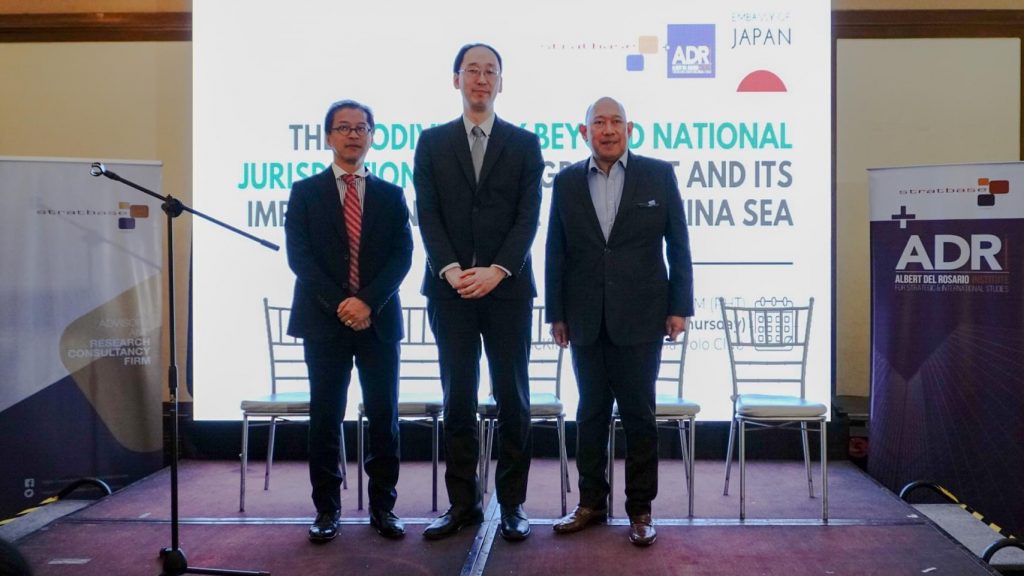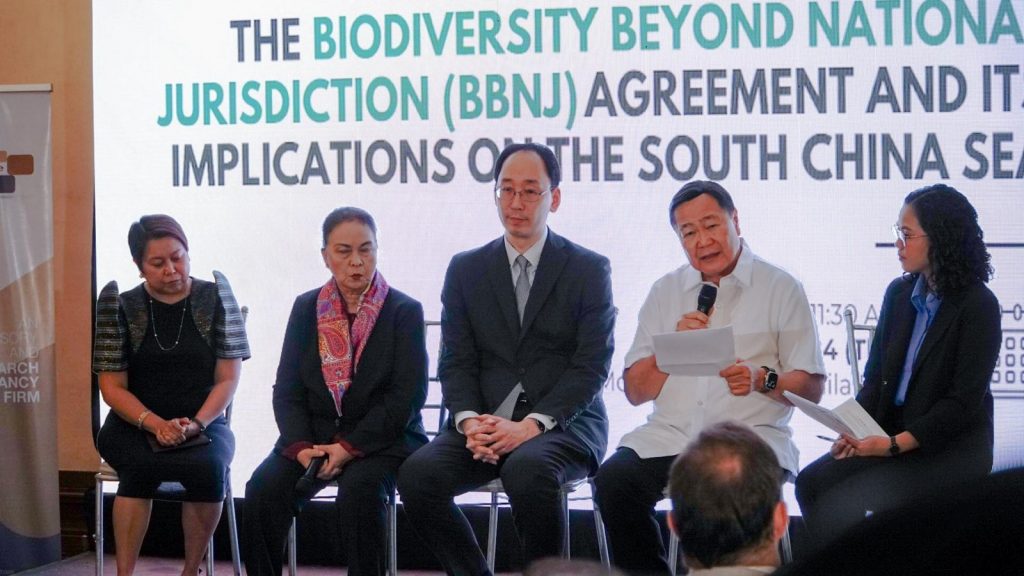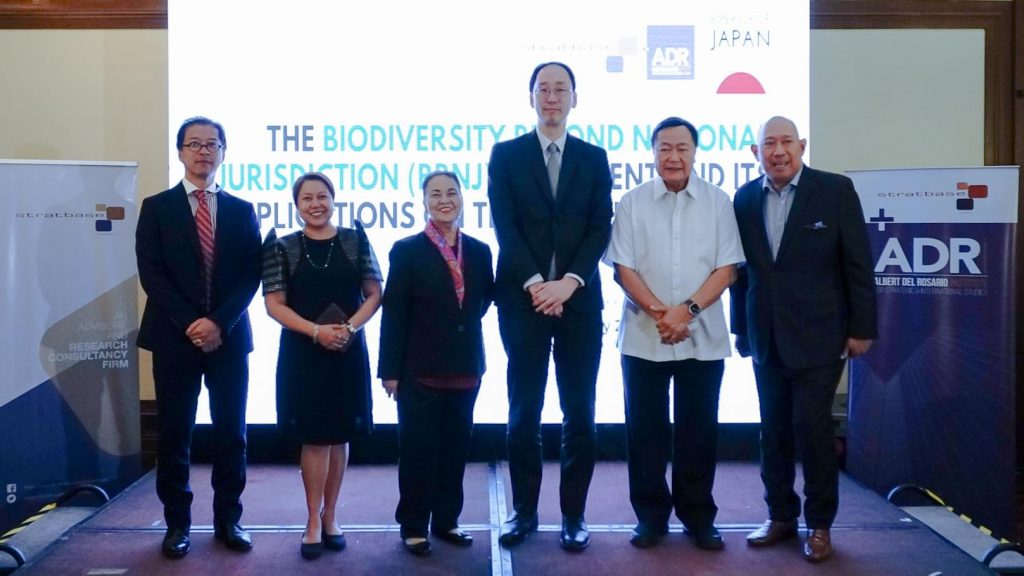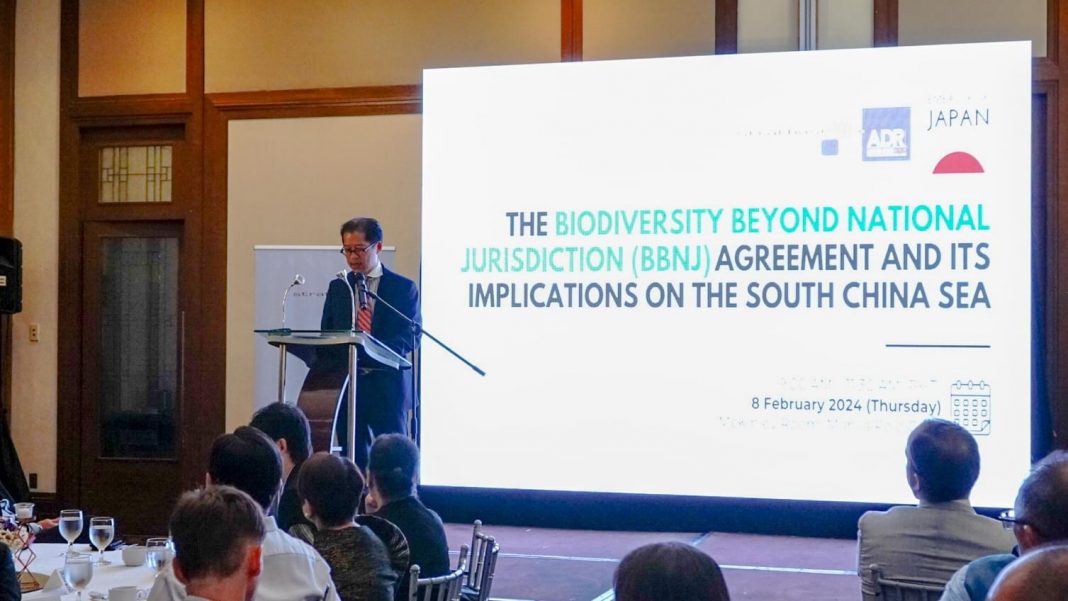By Monsi A. Serrano
The Embassy of Japan in the Philippines, in partnership with Stratbase ADR Institute, organized a forum to discuss the the protection of Philippines’ marine resources in its exclusive economic zone (EEZ) from China’s unabated aggression and territorial expansion.
The event which was called “The Biodiversity Beyond National Jurisdiction (BBNJ) Agreement and its Implications on the South China Sea” was held on February 8, 2024, at the Manila Polo Club in Makati City, unraveling the complexities of international maritime law, with a particular focus on the BBNJ Agreement and its impact on the dynamic region.
Both Filipino and Japanese experts agreed that international cooperation is vital in protecting marine resources in the South China Sea amid continuous destructive activities by an aggressive and coercive state.

Minister Kenichi Matsuda, Deputy Chief of Mission of the Embassy of Japan in the Philippines, delivered insightful remarks to kick-start the program. In his message, Minister Matsuda reaffirmed Japan’s commitment to the rule of law and collaboration with like-minded partners in ensuring maritime freedom and environmental protection. “As enhancing the rule of law is one of Japan’s foreign policy pillars, we are determined to work together hand-in-hand with other like-minded partners, especially with the Philippines, to ensure that universally accepted values and principles,” Min. Matsuda highlights.
Meanwhile, Tohoku University International Law Professor Nishimoto Kentaro explained that the agreement will ensure the conservation and sustainable use of marine biological diversity in areas beyond a country’s national jurisdiction through international cooperation and coordination.

A panel discussion followed featuring prominent figures in the field, including Justice Antonio Carpio, former Senior Associate Justice of the Supreme Court of the Philippines; Dr. Rhodora Azanza, Professor Emeritus at the University of the Philippines Marine Science Institute and Former President of the National Academy of Science and Technology; and Dr. Mary Kristerie Baleva, Director for International Affairs and Treaties at the ASEAN Centre for Biodiversity. The panelists engaged in an enriching exchange of ideas, providing diverse perspectives on the implications of the BBNJ Agreement in the South China Sea. Closing the roundtable, Prof. Victor Andres Manhit, President of the Stratbase ADR Institute, expressed gratitude for the insightful contributions and discussions.

For international think tank Stratbase Institute’s President Dindo Manhit, he noted that despite laws to protect maritime territories and their resources, issues continue to persist in the West Philippine Sea.
“As an archipelagic nation, the Philippines understands the value of countering biodiversity loss and protecting marine resources from degradation… in 2023, the Armed Forces of the Philippines reported the massive illegal coral harvesting in Rozul Reef and the dumping of dead corals at Sandy Cay in the West Philippine Sea. The Stratbase ADR Institute considers these as acts of aggression and coercion,” Manhit said.
Manhit agreed that states are expected to protect the marine environment beyond their country’s jurisdiction.
“The depths of the ocean call on the international community to work together in protecting shared marine resources. Let us equip ourselves with the knowledge and share technical expertise to protect the global common. ” Manhit explained.
“Such cooperation contributes to strengthening the rules-based international order that has so far fostered peace and stability in international relations,” he added.
Looking ahead, Manhit said the challenge lies in sustaining states’ commitment to the BBNJ agreement and ensuring the successful attainment of its objectives.
“Our united stance in caring for our waters reflects our deep interconnectedness, transcending national borders. Let us remain committed to the conservation and sustainability of marine resources. Together, let us protect our interconnected waters beyond national jurisdiction,” Manhit said.
Minister Matsuda assured the Philippines of Japan’s unwavering commitment to the uphold international rule of law to prevail.
“Amidst this growing instability, Japan remains undeterred with its commitment to create an international community upholding the rule of the law. As enhancing the rule of law is one of Japan’s foreign policy pillars, we are determined to work together hand-in-hand with other like-minded partners, especially with the Philippines, to ensure that universally accepted values and principles,” Matsuda said.
“Guided by the vision of a Free and Open Indo-Pacific, Japan strives to ensure the freedom of navigation and overflight in the East and South China Seas, the protection and preservation of the maritime environment, and the peaceful settlement of disputes,” he added.














